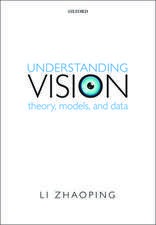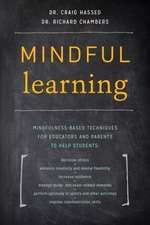Thinking and Problem Solving: Handbook of Perception and Cognition, cartea 2
Editat de Robert J. Sternbergen Limba Engleză Paperback – 26 mai 1998
Thinking and Problem-Solving provides insight into questions such as: how do people solve complex problems in mathematics and everyday life? How do we generate new ideas? How do we piece together clues to solve a mystery, categorize novel events, and teach others to do the same?
- Provides a comprehensive literature review
- Covers both historical and contemporary approaches
- Organized for ease of use and reference
- Chapters authored by leading scholars
Preț: 468.56 lei
Preț vechi: 608.53 lei
-23% Nou
Puncte Express: 703
Preț estimativ în valută:
89.66€ • 93.86$ • 74.19£
89.66€ • 93.86$ • 74.19£
Carte tipărită la comandă
Livrare economică 05-19 aprilie
Preluare comenzi: 021 569.72.76
Specificații
ISBN-13: 9780126672602
ISBN-10: 0126672601
Pagini: 488
Dimensiuni: 152 x 229 x 21 mm
Greutate: 0.66 kg
Ediția:Revised
Editura: ELSEVIER SCIENCE
Seria Handbook of Perception and Cognition
ISBN-10: 0126672601
Pagini: 488
Dimensiuni: 152 x 229 x 21 mm
Greutate: 0.66 kg
Ediția:Revised
Editura: ELSEVIER SCIENCE
Seria Handbook of Perception and Cognition
Public țintă
Advanced students, academics, researchers in cognition, education, perception, and decision-making.Cuprins
R.L. Dominowski and L.E. Bourne, Jr., History of Research on Thinking and Problem Solving.
K.A. Ericsson and R. Hastie, Contemporary Approaches to the Study of Thinking and Problem Solving.
T.P. McNamara, Knowledge Representation.
B.H. Ross and T.L. Spalding, Concepts and Categories.
L.J. Rips, Deduction and Its Cognitive Basis.
J. Bisanz, G.L. Bisanz, and C.A. Korpan, Inductive Reasoning.
E. Hunt, Problem Solving.
R.J. Gerrig and M.R. Banaji, Language and Thought.
R.J. Sternberg, Intelligence.
T.I. Lubart, Creativity.
S. Ellis and R.S. Siegler, Development of Problem Solving.
R. Serpell and A.W. Boykin, Cultural Dimensions of Cognition: A Multiplex, Dynamic System of Constraints and Possibilities.
R.S. Nickerson, The Teaching of Thinking and Problem Solving.
Index.
K.A. Ericsson and R. Hastie, Contemporary Approaches to the Study of Thinking and Problem Solving.
T.P. McNamara, Knowledge Representation.
B.H. Ross and T.L. Spalding, Concepts and Categories.
L.J. Rips, Deduction and Its Cognitive Basis.
J. Bisanz, G.L. Bisanz, and C.A. Korpan, Inductive Reasoning.
E. Hunt, Problem Solving.
R.J. Gerrig and M.R. Banaji, Language and Thought.
R.J. Sternberg, Intelligence.
T.I. Lubart, Creativity.
S. Ellis and R.S. Siegler, Development of Problem Solving.
R. Serpell and A.W. Boykin, Cultural Dimensions of Cognition: A Multiplex, Dynamic System of Constraints and Possibilities.
R.S. Nickerson, The Teaching of Thinking and Problem Solving.
Index.
Recenzii
"This volume provides a collection of historical and up-to-date literature reviews on issues central to thinking and problem solving... the most impressive chapters, which set this book apart from typical undergraduate cognitive psychology books, reconsider the relationship of language and thought in the context of the Sapir-Whorf hypothesis; offer a comprehensive review of definitions, models, and techniques of measuring creativity; describe the development of problem solving in infancy and childhood; call for an inclusion of cultural and cross-cultural considerations of cognition; and discuss the rationale and methods of formally teaching thinking and problem solving...As a source of current and extensively referenced in-depth essays, this is a valuable resource for upper-division undergraduates, graduates, and faculty working in cognitive and educational psychology." --CHOICE
"Almost all of the chapters are accessible and intelligible to educated readers whether they are psychologists or not. This is an unexpected and impressive accomplishment for a handbook... Almost every chapter gives a balanced description of the major perspectives or theoretical viewpoints that allow the reader to see the structure of the major approaches to each topic... The work admirably fulfills the stated purpose of both the volume and the series." --CONTEMPORARY PSYCHOLOGY
"Almost all of the chapters are accessible and intelligible to educated readers whether they are psychologists or not. This is an unexpected and impressive accomplishment for a handbook... Almost every chapter gives a balanced description of the major perspectives or theoretical viewpoints that allow the reader to see the structure of the major approaches to each topic... The work admirably fulfills the stated purpose of both the volume and the series." --CONTEMPORARY PSYCHOLOGY



















